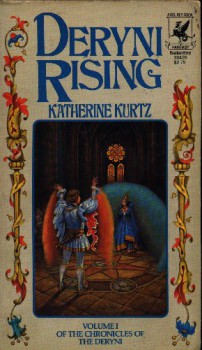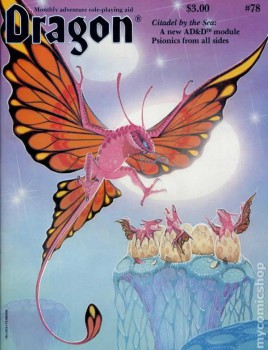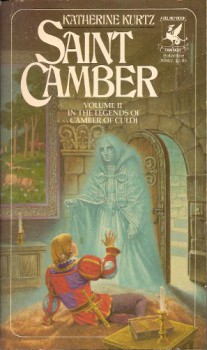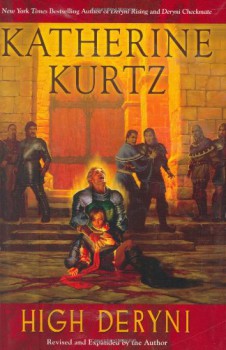Old Favorites: Katherine Kurtz’s Deryni
 I don’t usually fan or geek out about stuff – my credentials in geekdom are rarely questioned, but I was thinking the other day about my influences and in what direction I might want them to go.
I don’t usually fan or geek out about stuff – my credentials in geekdom are rarely questioned, but I was thinking the other day about my influences and in what direction I might want them to go.
I’ve been reading a lot of space opera and really hard sci-fi lately, mostly Alastair Reynolds with a side of Stephen Baxter, as I get ready to start a new novel. But hard sci-fi and fantasy are just setting. Any plot structure can fit inside them. Baxter is a lot of adventure. Reynolds is very noir.
 That got me to thinking about what stories I enjoyed and why. One of the appeals of Game of Thrones is how it’s a giant soap opera. Claremont’s run on Uncanny X-Men was similarly soapy, as was the reimagined Battlestar Galactica.
That got me to thinking about what stories I enjoyed and why. One of the appeals of Game of Thrones is how it’s a giant soap opera. Claremont’s run on Uncanny X-Men was similarly soapy, as was the reimagined Battlestar Galactica.
And that reminded me of how much I loved Katherine Kurtz’s Deryni series as a teen. The Kingdom of Gwynedd, a human world of the Middle Ages with a scattering of persecuted psionic families, has always seemed to me to be one of those surprisingly under-appreciated corners of fantasy.
The only reason I’d ever heard of it was because of issue #78 of Dragon magazine, which was an issue devoted to psionics in AD&D, and one of the articles featured the characters of Kurtz’s Gwynedd in role-playing terms. I looked for her books at my local second-hand store as soon as I could.
Right away, I found two of Kurtz’s core trilogies, the Deryni series (Deryni Rising, Deryni, and High Deryni) and the Camber series (Camber of Culdi, Saint Camber, and Camber the Heretic), and even after only the first one, I was hooked.
 Kurtz, a member of the Society for Creative Anachronism, layered in such religious, social, and cultural detail that the novels were an immersive experience. At the same time, they were fast-paced, with high stakes. But most importantly, I think they had two of the key elements that made Claremont’s Uncanny X-Men so strong: the soap opera and the persecution.
Kurtz, a member of the Society for Creative Anachronism, layered in such religious, social, and cultural detail that the novels were an immersive experience. At the same time, they were fast-paced, with high stakes. But most importantly, I think they had two of the key elements that made Claremont’s Uncanny X-Men so strong: the soap opera and the persecution.
The persecution story is powerful and haunting and it gets beneath your skin and sticks there with barbs. Good people get hurt and killed because of the ignorance and needless prejudices of the larger world.
The Christian church is a powerful, three-dimensionally good and evil organization, with admirable, godly men and people who would have comfortably fit in the Spanish Inquisition. It frustrates because it doesn’t need to happen, but it does, just like it does in real life.
 The Deryni series stars King Kelson, a young king with artificial psionic powers, his trusted deryni agents, and all the ups and downs of a political struggle worthy of George R.R. Martin.
The Deryni series stars King Kelson, a young king with artificial psionic powers, his trusted deryni agents, and all the ups and downs of a political struggle worthy of George R.R. Martin.
The Camber series has a similar epic adventure feel, but is to my mind much darker, because it happens 200 years before the Deryni series and shows how the Deryni, once respected members of society, come to a crashing fall as prejudice takes over.
Some of Kurtz’s later books in the same universe are still good, but there’s a slow decline from the power of her earliest work. Still, the depth of character, culture, and religion, and the examination of persecution and human ignorance, made such a rich tapestry that I realized that Kurtz’s two trilogies have a lot for me to think about as I embark on a new novel.
I recommend these two trilogies to any fantasy fan.
Derek writes science fiction, fantasy and sometimes horror in Gatineau, Quebec. You can find out more about him at www.derekkunsken.com or @derekkunsken.
I love that Dragon! And that’s probably also what inspired me to read Kurtz as well — I read the Camber books back in high school (because that’s the “beginning”, right? I mean, it happens before the original trilogy) and read the actual Deryni books years later as part of a Ballantine Adult Fantasy read-through (Kurtz being one of maybe two authors? Joy Chant being the other, who debuted in BAF editions.)
I may have said this in previous comments, but looking back it’s kind of amazing how profoundly Dragon Magazine shaped my reading, both in its actual reviews and its articles like this one about adapting elements from existing books.
Joe H. said: “I may have said this in previous comments, but looking back it’s kind of amazing how profoundly Dragon Magazine shaped my reading, both in its actual reviews and its articles like this one about adapting elements from existing books.”
This could’ve come directly out of my mouth as well. Dragon Magazine was a gateway to discovering lots of different books and subjects for me as well.
Extremely depressing and a bit tough to get through near the end, but the Deryni books have long been favorites of mine. I’ve even got a copy of the Codex Derynianus!
I believe that the religious persecution aspect influenced Jordan’s Whitecloaks.
Nice to see the Deryni mentioned at Black Gate.
Joe and James: Yeah – I love old Dragon. I ended up buying the digitized version on 5 CDs. I like it and will start showing to my son now that he’s playing Basic D&D.
Bob: Yeah – I think the Harrowing of Gwynedd and King Javan’s Year and the Bastard Prince are difficult to read, and worth it, but didn’t recommend them here. They’re not gateway books 🙂
[…] Our recent coverage of Katherine Kurtz includes Derek Kunsken’s article “Old Favorites: Katherine Kurtz’s Deryni.” […]